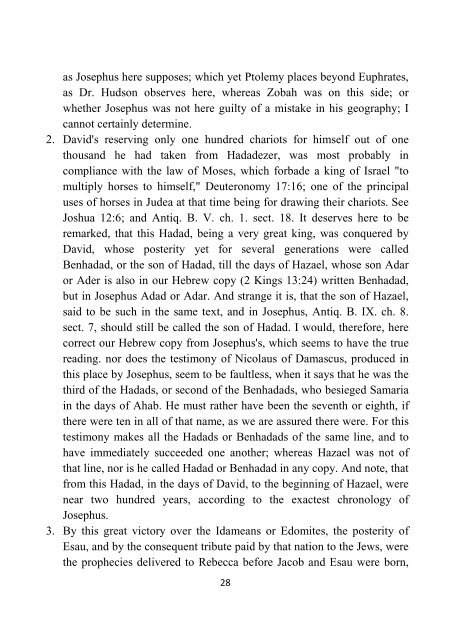You also want an ePaper? Increase the reach of your titles
YUMPU automatically turns print PDFs into web optimized ePapers that Google loves.
as <strong>Josephus</strong> here supposes; which yet P<strong>to</strong>lemy places beyond Euphrates,<br />
as Dr. Hudson observes here, whereas Zobah was on this side; or<br />
whe<strong>the</strong>r <strong>Josephus</strong> was not here guilty <strong>of</strong> a mistake in his geography; I<br />
cannot certainly determine.<br />
2. <strong>David</strong>'s reserving only one hundred chariots for himself out <strong>of</strong> one<br />
thousand he had taken from Hadadezer, was most probably in<br />
compliance with <strong>the</strong> law <strong>of</strong> Moses, which forbade a king <strong>of</strong> Israel "<strong>to</strong><br />
multiply horses <strong>to</strong> himself," Deuteronomy 17:16; one <strong>of</strong> <strong>the</strong> principal<br />
uses <strong>of</strong> horses in Judea at that time being for drawing <strong>the</strong>ir chariots. See<br />
Joshua 12:6; and Antiq. B. V. ch. 1. sect. 18. It deserves here <strong>to</strong> be<br />
remarked, that this Hadad, being a very great king, was conquered by<br />
<strong>David</strong>, whose posterity yet for several generations were called<br />
Benhadad, or <strong>the</strong> son <strong>of</strong> Hadad, till <strong>the</strong> days <strong>of</strong> Hazael, whose son Adar<br />
or Ader is also in our Hebrew copy (2 Kings 13:24) written Benhadad,<br />
but in <strong>Josephus</strong> Adad or Adar. And strange it is, that <strong>the</strong> son <strong>of</strong> Hazael,<br />
said <strong>to</strong> be such in <strong>the</strong> same text, and in <strong>Josephus</strong>, Antiq. B. IX. ch. 8.<br />
sect. 7, should still be called <strong>the</strong> son <strong>of</strong> Hadad. I would, <strong>the</strong>refore, here<br />
correct our Hebrew copy from <strong>Josephus</strong>'s, which seems <strong>to</strong> have <strong>the</strong> true<br />
reading. nor does <strong>the</strong> testimony <strong>of</strong> Nicolaus <strong>of</strong> Damascus, produced in<br />
this place by <strong>Josephus</strong>, seem <strong>to</strong> be faultless, when it says that he was <strong>the</strong><br />
third <strong>of</strong> <strong>the</strong> Hadads, or second <strong>of</strong> <strong>the</strong> Benhadads, who besieged Samaria<br />
in <strong>the</strong> days <strong>of</strong> Ahab. He must ra<strong>the</strong>r have been <strong>the</strong> seventh or eighth, if<br />
<strong>the</strong>re were ten in all <strong>of</strong> that name, as we are assured <strong>the</strong>re were. For this<br />
testimony makes all <strong>the</strong> Hadads or Benhadads <strong>of</strong> <strong>the</strong> same line, and <strong>to</strong><br />
have immediately succeeded one ano<strong>the</strong>r; whereas Hazael was not <strong>of</strong><br />
that line, nor is he called Hadad or Benhadad in any copy. And note, that<br />
from this Hadad, in <strong>the</strong> days <strong>of</strong> <strong>David</strong>, <strong>to</strong> <strong>the</strong> beginning <strong>of</strong> Hazael, were<br />
near two hundred years, according <strong>to</strong> <strong>the</strong> exactest chronology <strong>of</strong><br />
<strong>Josephus</strong>.<br />
3. By this great vic<strong>to</strong>ry over <strong>the</strong> Idameans or Edomites, <strong>the</strong> posterity <strong>of</strong><br />
Esau, and by <strong>the</strong> consequent tribute paid by that nation <strong>to</strong> <strong>the</strong> Jews, were<br />
<strong>the</strong> prophecies delivered <strong>to</strong> Rebecca before Jacob and Esau were born,<br />
28

















